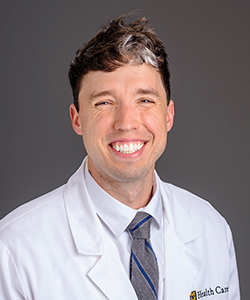October 22, 2025

Eyes may be the window to the soul, but they are also our windows to the world. So, when something changes with your eyesight — you see a "floater" or suddenly need to use your phone light to read menus — it can be scary.
You likely have questions: Why is this happening? How long will it last? Is it serious?
To get some insight into what's normal and what's not when it comes to vision changes, we turned to ophthalmologist James Landreneau, MD, who specializes in cornea and refractive surgery at MU Health Care.
To put your mind — and your eyes — at ease, Dr. Landreneau shares five things you need to know about vision changes and keeping your eyes healthy:
1. Most Vision Changes Are Age-Related
Your vision can change suddenly at any age and for a variety of reasons. "But the risk and occurrence of most vision issues tend to increase with age," Dr. Landreneau says. "The important thing is recognizing whether the changes stem directly from aging or from an underlying acute or non-eye issue."
Some eye-related changes are more likely to occur as your eye deteriorates with age. The most common age-related changes include:
- Dry eye: This inflammatory condition can make your eyes feel dry and scratchy, but it can also cause blurry vision, a burning sensation and tearing (overproducing tears).
- Presbyopia: As you get older — beginning as early as your 30s — your eyes have a harder time focusing up close or in dim light.
Other vision changes may signal an acute, underlying issue. As the risk for that issue increases with age, so does the risk for associated vision changes. Concerning changes include:
- Floaters: Seeing something floating in your eye occasionally is a normal part of aging. However, seeing a random assortment of floaters all at once could be a sign of retinal detachment — the thin layer of tissue at the back of the eye pulls away from the tissue supporting it. This is an emergency that requires an immediate dilated exam. If you’re unsure or concerned about your floaters, Dr. Landreneau recommends scheduling an eye exam right away.
- Losing vision: A third of our brain is devoted to processing vision, says Dr. Landreneau. So, any neurological issue or traumatic brain injury can lead to some type of vision loss. Depending on which area of your vision is lost, it may signal a stroke.
"While sudden vision changes are rare in younger adults, they can happen," Dr. Landreneau says. If you notice abrupt, persistent or worsening changes to your vision, get checked out by an eye doctor.
2. DIY Fixes for Vision Problems Are Not a Long-Term Solution
For whatever reason — denial, maybe — many people attempt to manage age-related eye changes on their own. Maybe you buy "readers" at the pharmacy or online to help with presbyopia, or you don't go anywhere without over-the-counter (OTC) dry eye drops.

"OTC options, like a preservative-free tear, can be helpful for ‘situational dry eye’ where maybe you’re spending a considerable amount of time focusing on reading, watching television or working for a prolonged time on the computer," Dr. Landreneau says. "But if you find yourself needing something more than an OTC option, it's a sign that you need to see an eye doctor."
For long-term treatment of dry eyes, an eye doctor may prescribe anti-inflammatory drops. If you are only having symptoms of dry eye occasionally, OTC solutions are fine but choose ones labeled "preservative-free."
Readers — no matter how cute they are or how many you purchase — are also only a temporary fix. Presbyopia will continue to worsen with age, requiring stronger reading glasses. At some point, most patients will require surgery such as cataract surgery.
"If you read with an incorrect prescription, the strain can damage your eyes," Dr. Landreneau says. "Prescription glasses can help you see and keep your eyes comfortable."
3. Putting Anything Near or In Your Eyes — Even Contact Lenses — Comes With Risk
Your eyes are naturally vulnerable to infection. They're in constant contact with your hands, towels and make-up — and the bacteria on them. The membranes and tissues of your eyes are also delicate and easily irritated, allowing germs to enter the eye.
When you put things in and around your eyes — specifically contact lenses and false eyelashes — you increase the risk of infection.
"A quarter of my business is related to contact lens-associated infections, and I've seen some gnarly infections from fake eyelashes," Dr. Landreneau says. He adds that in severe cases of infection, he may need to perform a cornea transplant — replacing the clear outermost layer of the eye with a donated cornea.
Dr. Landreneau recommends staying away from false eyelashes entirely (sorry) and making smart decisions with contact lenses, such as:
- Disinfect your lenses with lens cleanser every time you remove them.
- Don't sleep with contact lenses in.
- Go without contact lenses at least one day weekly.
4. Some Chronic Diseases Can Be Diagnosed by Looking at Your Eyes
Doctors can tell a lot about your health by looking at the health of your eyes. Neurological diseases, such as multiple sclerosis, often affect the eyes first. Autoimmune diseases can cause inflammation that mimics pink eye. Eyes are also the only area of the body where a doctor can directly see the activity of your vascular structure — your body's complex network of blood vessels.
"Anything affecting your vascular network can be seen through the eye," Dr. Landreneau says. "As an eye doctor, I'm often the first to detect a systemic disease based on what's happening with your vision or what I see within your eyes."
Dr. Landreneau recommends everyone age 40 and older get their eyes dilated by an eye doctor. They'll use special eye drops to widen your pupils — the dark openings in the center of your eyes — which will enable the doctor to view the internal structures of the eye.
5. Lifestyle Changes Can Help Prevent Many Eye Problems
Your lifestyle choices can affect your eye health. Making choices that prioritize your vision and general health can reduce your risk of eye issues.
To keep your eyes healthy, Dr. Landreneau recommends lifestyle practices including:
- Don't sleep with the fan on, which can dry out your eyes.
- Don't smoke, because it increases the risk of cataracts and macular degeneration — an eye disease that makes it hard to see things directly in front of you.
- Eat healthy fats, which can lower your risk for many eye diseases, such as macular degeneration.
- Give your eyes a break from screen time, by looking at something 20 feet away for 20 seconds, every 20 minutes.
- Keep your phone out of your bed, because staring at a bright phone in darkness can strain your eyes.
- Practice good eyelid hygiene by cleaning your eyelids and eyelashes (regular soap works fine) whenever you wash your face.
"Every eye disease is directly impacted by your lifestyle," Dr. Landreneau says. "It's hard to cite a specific study showing that eating a certain food will lead to better eye health. But we know that patients who smoke or don't get enough fat in their diet will be prone to many eye diseases."
Next Steps and Useful Resources
- Want to discuss more? Speak with an ophthalmologist.


